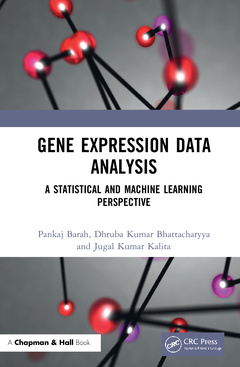Gene Expression Data Analysis A Statistical and Machine Learning Perspective
Auteurs : Barah Pankaj, Bhattacharyya Dhruba Kumar, Kalita Jugal Kumar

Development of high-throughput technologies in molecular biology during the last two decades has contributed to the production of tremendous amounts of data. Microarray and RNA sequencing are two such widely used high-throughput technologies for simultaneously monitoring the expression patterns of thousands of genes. Data produced from such experiments are voluminous (both in dimensionality and numbers of instances) and evolving in nature. Analysis of huge amounts of data toward the identification of interesting patterns that are relevant for a given biological question requires high-performance computational infrastructure as well as efficient machine learning algorithms. Cross-communication of ideas between biologists and computer scientists remains a big challenge.
Gene Expression Data Analysis: A Statistical and Machine Learning Perspective has been written with a multidisciplinary audience in mind. The book discusses gene expression data analysis from molecular biology, machine learning, and statistical perspectives. Readers will be able to acquire both theoretical and practical knowledge of methods for identifying novel patterns of high biological significance. To measure the effectiveness of such algorithms, we discuss statistical and biological performance metrics that can be used in real life or in a simulated environment. This book discusses a large number of benchmark algorithms, tools, systems, and repositories that are commonly used in analyzing gene expression data and validating results. This book will benefit students, researchers, and practitioners in biology, medicine, and computer science by enabling them to acquire in-depth knowledge in statistical and machine-learning-based methods for analyzing gene expression data.
Key Features:
- An introduction to the Central Dogma of molecular biology and information flow in biological systems
- A systematic overview of the methods for generating gene expression data
- Background knowledge on statistical modeling and machine learning techniques
- Detailed methodology of analyzing gene expression data with an example case study
- Clustering methods for finding co-expression patterns from microarray, bulkRNA, and scRNA data
- A large number of practical tools, systems, and repositories that are useful for computational biologists to create, analyze, and validate biologically relevant gene expression patterns
- Suitable for multidisciplinary researchers and practitioners in computer science and biological sciences
Preface. Acknowledgements. Abstract. Authors. Introduction. Information Flow in Biological Systems. Gene Expression Data Generation. Statistical Foundations and Machine Learning. Co-expression Analysis. Differential Expression Analysis. Tools and Systems. Concluding Remarks and Research Challenges. Index. Glossary.
Pankaj Barah is an Assistant professor in Molecular Biology and Biotechnology at Tezpur University. He has received his M.Sc. degree in Bioinformatics (2006) from University of Madras in India and PhD in Computational Systems Biology (2013) from the Norwegian University of Science and Technology (NTNU), Trondheim, Norway. He has worked as Bioinformatics scientist in the division of Theoretical Bioinformatics at German Cancer Research Center (DKFZ) in Heidelberg, Germany during 2015-2017. His research areas include- computational systems biology, bioinformatics, evolutionary systems biology, Next Generation Sequencing (NGS), Big data analytics and biological networks. He has authored 20 research articles, edited two books and written 5 book chapters. He is recipient of Ramalingaswami Re-entry Fellowship from the Department of Biotechnology, Government of India. Dr. Barah is currently a member of the Indian National Young Academy of Sciences.
Dhruba Kumar Bhattacharyya is a professor in Computer Science and Engineering at Tezpur University. He teaches machine learning, network security, cryptography and computational biology in UG, PG and PhD classes at Tezpur University. Professor Bhattacharyya's research areas include machine learning, network security, and bioinformatics. He has published more than 280 research articles in leading international journals and peer-reviewed conference proceedings. Dr. Bhattacharyya has authored 5 technical reference books and edited 9 technical volumes. Under his guidance, twenty students have successfully completed Ph.D. in the areas of machine learning, bioinformatics and network security. He is PI of several major research grants, including the Centre of Excellence of Ministry of HRD of Government of India under FAST instituted at Tezpur University. Professor Bhattacharyya is a Fellow of IETE and IE, India. He is also a Senior Member of IEEE. More details about Dr Bhattacharyya can be fou
Date de parution : 11-2021
15.6x23.4 cm
Thèmes de Gene Expression Data Analysis :
Mots-clés :
RNAseq Data; Bioinformatics; Gene Expression Data; Data Mining; Gene Expression Data Analysis; Biomedical Discoveries; Co-expression Analysis; Health Informatics; Differential Expression Analysis; Algebraic Statistics; RNA Seq Data; Biology and Health; Co-expression Network; Computational Biology; Co-expression Network Analysis; Gene Expression Dataset; RNA Seq Dataset; Microarray Data; Single Cell RNA Sequencing; DE Gene; Generic Cen; External Validity Measures; DNA Dependent DNA Polymerase; RNA Dependent DNA Polymerase; Gene Selection; Systems Biology Tools; Regulatory Network Analysis; Subspace Clustering; Gene Set Enrichment Analysis; DNA Strand; Biclustering Algorithms; High Throughput Sequencing Platforms



